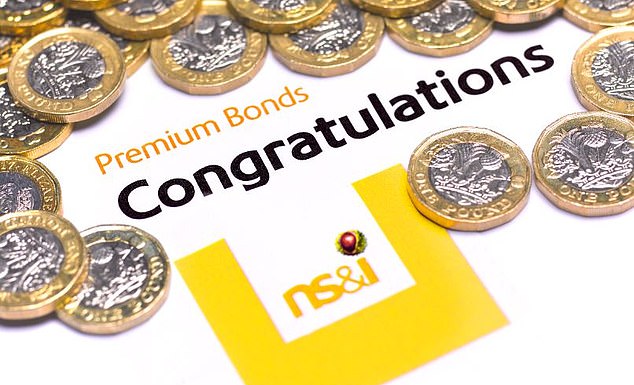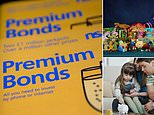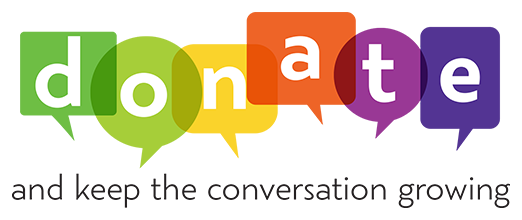- Savings experts lay out merits of Premium Bonds versus Isas and saver deals
It might not top any child’s Christmas present list, but many parents might be considering a gift of savings for their children this year.
And top of that list are National Savings & Investments (NS&I) Premium Bonds, which are often gifted.
But is it worth buying these bonds as a financial gift for a child’s future, saving little and often – or would the guaranteed return of a savings account or Junior Isa prove a better investment?
Premium Bonds are a hit with parents, and grandparents can their head around them, due to the nature of the monthly prize draw, plus the fact that they can be opened on behalf of children under the age of 16.
More than 24 million people hold Premium Bonds. Prizes range from £25 to £1million, with the winning numbers chosen by ERNIE, NS&I’s electronic random number generator.
We spoke to three savings experts to find out whether buying Premium Bonds or other savings deals are the best idea this Christmas.

There are two of the coveted £1million jackpot prizes, which keep savers coming back every month.
Premium Bonds allow you to save a minimum of £25 and a maximum of £50,000.
It is no secret that the more bonds you hold, the more chance you have of winning a prize. Each £1 invested in Premium Bonds gets you one entry in the Premium Bonds prize draw.
Currently, the odds of any £1 bond winning a prize are 22,000 to one, with the Premium Bonds prize fund rate – or the average prize payout per year – standing at 4 per cent from next month’s draw.
For that reason, unless you intend on putting away a large sum into Premium Bonds, nearing the maximum holding of £50,000, it is very unlikely you will win meaningful prizes.
The average amount an NS&I customer has stashed away in Premium Bonds is £5,250.
James Blower, founder of website Savings Guru said: ‘Unless putting in around several thousand pounds, the chances of winning anything is small. Someone with £1,000 saved in Premium Bonds with average luck will win nothing in a given month.’
Andrew Hagger, founder of website MoneyComms, said: ‘If you’re only going to invest a relatively small sum for them, say a couple of hundred pounds, the chances of winning anything are extremely low.’
As a result, Anna Bowes, founder of website Savings Champion, said: ‘There might be better options for children, especially if you would like to teach them the value of saving – rather than hoping to “get rich quick” with a big win on the Premium Bonds.’
While improbable, it’s not impossible that your child could win a prize with a small holding of Premium Bonds.
Nothing quite embodies this as much as the 2004 £1million jackpot winner from Newham in London, who won with a mere £17 in Premium Bonds which they purchased in February 1959.
But with the odds currently at 22,000 to one, they would be very lucky to win anything.
If you are not the parent of the child you want to open up Premium Bonds for, it will likely be easier to ask the parent to open the account.
That way it is the parent that will look after the bonds until the child turns 16. At that point, the child is able to look after their own bonds.
NS&I will also need to contact the parent to provide proof of identiy and address and all correspondence will be with them.
Once the account is open, you can then transfer in money to buy more bonds directly.
How else could you put away money for children?
Like adult accounts, there is a variety of savings accounts available for children, from easy access-accounts to tax-free Junior Isas which cannot be accessed until age 18.
Bowes said: ‘A junior Isa can provide either a variable cash savings interest rate return, or stock market investment return and importantly any return is tax free to both child and parent, if the gift has come from them.
‘It’s important to pick the right account meet your children’s needs – money in a Junior Isa cannot be accessed until the age of 18, although at this point it could be moved into an adult Isa, including a Lifetime Isa if they are still available, which could see those savings earning a 25 per cent bonus.’
The best children’s easy-access account is paying up to 5 per cent – the HSBC MySavings Account. This rate is paid on up to £3,000 only – no interest is paid on anything over that.
There are also quite a few regular savings accounts which can be a good place to put money away every month.
However, these generally shouldn’t be considered for cash that might be needed on a day-to-day basis, as there will usually be a penalty for early access, or there might be no access allowed at all until maturity.
The best is with Halifax. The Kid’s Monthly Saver Account is currently paying 5.5 per cent for 12 months and no withdrawals are allowed within the term.
You can save between £10 and £100 per month by standing order. This amount can be changed, but you can’t put more than £100 in each month, even if you have paid less in a previous month.
Andrew Hagger said: ‘While the capital sum is safe in Premium Bonds, over time the value of the bonds will be eroded by inflation, so a better option is to consider paying money into a Junior Isa – via the child’s parents.
‘You can invest up to £9,000 tax free per annum at present and for a cash Junior Isa which you can open online (with Tesco Bank and NS&I), you can earn interest at 4 per cent – so an above-inflation return at present.’
It is worth checking your local building society as some pay more than this. Beverley Building Society pays 4.9 per cent, while Nottingham Building Society pays 4.75 per cent, but you need to live in the former’s catchment area or go into the branch of the latter.
James Blower replies: ‘Gifting via a Junior Isa would be my suggestion. For young children where there is at least a five to 10 year time horizon, then stocks and shares are likely to be a good bet. For those who don’t want to take risk, Coventry Building Society pays 4.5 per cent on its Junior cash Isa, which is open to all.’
SAVE MONEY, MAKE MONEY
Affiliate links: If you take out a product This is Money may earn a commission. These deals are chosen by our editorial team, as we think they are worth highlighting. This does not affect our editorial independence. *Chase: Cashback available for first year. Exceptions apply. 18+, UK residents.



